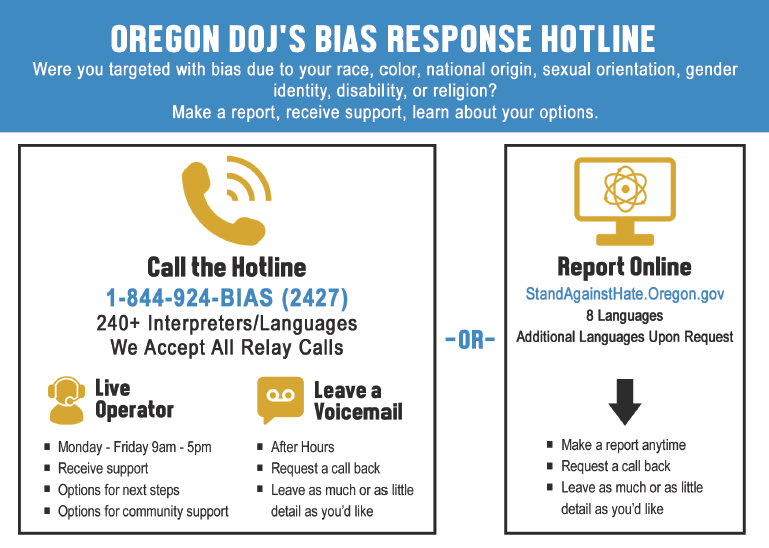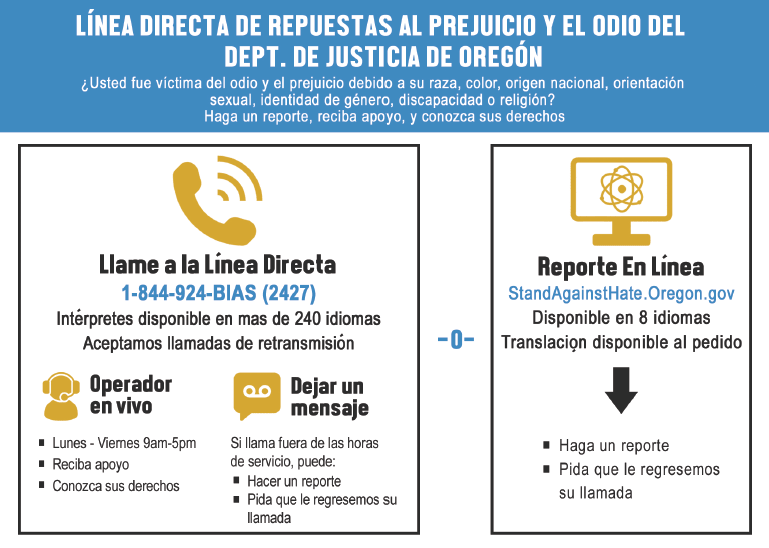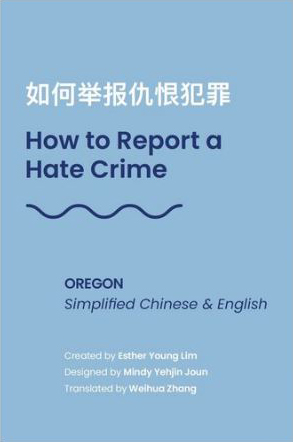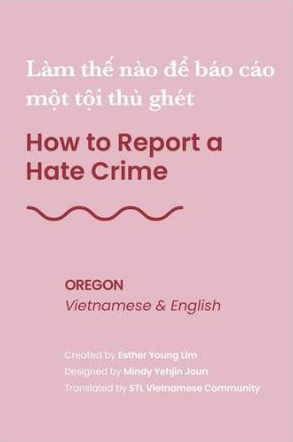We Want to Hear from You
If you have been the victim of or witness to a bias incident or bias crime, the Oregon DOJ Bias Response Hotline wants to know about it, and we want to help support you. The services listed here offer support, assistance and more information for anyone who has been impacted by a bias crime or incident.
Bias Response Emergency Fund – **We are sorry: As of February 2025, there are No Remaining Funds.**
Starting April 1, 2022, the Bias Response Hotline will open applications for a limited emergency fund to assist victims of hate crimes and bias incidents in Oregon in their recovery. The fund may pay up to $1,000 for emergency costs incurred within 90 days of a bias incident or bias crime to assist with safety that a survivor is otherwise unable to afford. The fund can cover expenses such as:
- Security measures, including buying and installing home security cameras and video doorbells, changing locks, and repairing windows and doors.
- Relocation for safety purposes, whether temporary or permanent, including rent or partial rent, security deposit, moving costs, emergency hotel stays, other transportation costs, or pet boarding.
- Costs incurred due to the bias incident or bias crime rendering the victim unable to work, including rent or partial rent, food costs, phone or internet bills, or other utility bills.
- Property damage directly resulting from the bias incident, including repairs/clean-up for hate speech graffitied on personal property, clean-up costs for damage done to the victim’s yard, vehicle or home, and insurance deductibles when insurance has covered the primary losses in these situations.
Please call the Bias Response Hotline to apply. Funds are not guaranteed.
Oregon Administrative Rules Chapter 137, Division 68, rules 137-068-0010 to 137-068-0050 guide this fund. For questions about the administrative rules, please contact Valerie Smith at 503-378-5348 or Valerie.Smith@doj.oregon.gov. Valerie is unable to accept applications for the emergency fund.
Legal Assistance
VictimsRightsAdvice.org» is a project of the National Crime Victim Law Institute» and Pro Bono Net». It is an interactive website providing victims of hate and bias crimes in Oregon with no-cost general legal advice during criminal case investigation and prosecution. Individuals can submit questions through the online portal, where volunteer attorneys provide brief, written legal advice. Here are some questions that can be answered through the Victims’ Rights Advice Portal».
Oregon Free Legal Answers» – Oregon State Bar recently launched a new online legal resource. Low-income clients submit questions on the law to a secure web portal. Pro bono lawyers log on at their convenience, choose a question they are qualified to answer, and provide free answers, advice and resources. It currently focuses primarily on landlord/tenant matters. They are starting to recruit lawyers in many other areas to join the program (consumer, family, immigration, employment and housing law).
Crime Victim & Survivor Services Division
The Oregon DOJ’s Crime Victim and Survivor Services Division (CVSSD) is here to reduce the impact of crime on victims’ lives. We help victims cover crime-related costs and we support statewide victim services programs. We promote and protect victims’ rights, and we provide information and resources.
Victim assistance programs » Every county in Oregon has a victim assistance program to help victims navigate the criminal justice system.
Crime Victims’ Compensation Program (CVC) » – CVC assists victims of violent crimes – including hate/bias crimes – to ease the financial burden suffered by the crime victim and their family. CVC can cover medical and counseling costs, rehabilitation services, loss of earnings, lost wages, crime scene cleanup, and funeral expenses not covered by insurance that stem from criminal conduct. Since April 2022, current and past bias incident and bias crime victims are eligible for the counseling benefit. No police report, charging decision by a DA’s office, or citizenship status is required.
Address Confidentiality Program» (ACP) is a free mail forwarding service. It helps victims of certain crimes shield their physical address. Program participants are provided with a substitute address to use instead of their real address. As of January 1, 2024, bias incident and bias crime victims are eligible for ACP. No police report, charging decision by a DA’s office, or citizenship status is required.
Hope Card Program» creates a convenient way for victims to provide information about their civil protection orders to law enforcement, employers, landlords, schools, and more.
Links to additional legal assistance resources »
Resources for Immigrants and Refugees »
Hate Crime Book
Oregon DOJ is proud to work with Esther Young Lim who created How to Report a Hate Crime ». Please see Oregon’s own booklets below:
Paid Leave Oregon
Paid Leave Oregon» can cover a percentage of lost wages for eligible employees who have been the victim of a bias crime for:
- Legal or law enforcement assistance for health/safety, including restraining orders, court, and court preparation.
- Medical treatment or recovery from injuries
- Counseling
- Seeking victim services
- Relocation or securing home for health/safety
Renters’ Rights Handbooks by Legal Aid Services of Oregon
Renters’ Handbook on Harassment/Hostile Living Environment » (English), with more information on Illegal Housing Discrimination here»
Manual para el inquilino sobre el acoso / ambiente de vivienda hostile » (en español), con más información sobre Discriminación ilegal en la vivienda aquí»
Additional Community and Population Specific Resources
Racial Equity Support Line» is led and staffed by people with lived experience of racism. We offer support to those who are feeling the emotional impacts of race-based violence and microaggressions, as well as the emotional impacts of immigration struggles and other cross-cultural issues. This line is available weekdays from 10am to 7pm PT. 503-575-3764
Oregon Disability Resources for Afghanistan Evacuee Relocation
Oregon Centers for Independent Living – Information in English (PDF)
Oregon Centers for Independent Living – Information in Pashto (PDF)
Oregon Centers for Independent Living – Information in Dari (PDF)
Centers for Independent Living may provide the following services:
- Information and referrals,
- Disability peer-counseling,
- Independent living skills training (budgeting and financial management, application assistance, etc.),
- Individual advocacy and systems advocacy
- Transition services (community relocation, nursing homes, assistance to those at risk of entering institutions, and youth to postsecondary life),
- Counseling,
- Assistance securing housing or shelter,
- Transportation referral and assistance,
- Physical therapy, and
- Mobility training.




